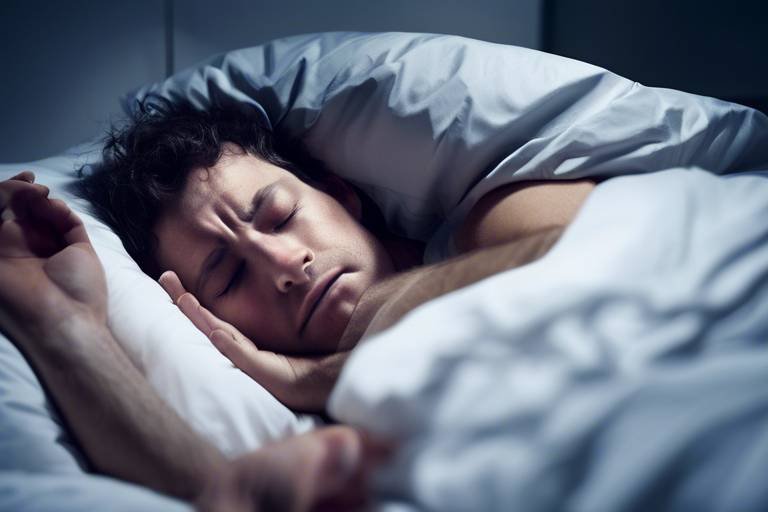The Biology of Sleep Cycles - Why They Matter
Sleep is not just a time for our bodies to rest; it is a complex biological process that plays a crucial role in our overall health and well-being. Have you ever wondered why you feel more energized after a good night's sleep? Or why you might struggle to focus after a restless night? The answer lies in the intricate biology of sleep cycles. These cycles are not merely a series of hours spent in bed; they are a carefully orchestrated sequence of stages that your body and brain navigate through each night. Understanding these cycles can help us appreciate their importance and empower us to make better choices for our sleep health.
At the core of sleep cycles are two main types of sleep: REM (Rapid Eye Movement) and Non-REM. Each type serves unique purposes that are vital for our physical and mental health. Non-REM sleep is essential for physical restoration, while REM sleep is critical for cognitive functions like memory consolidation and emotional regulation. Imagine your body as a smartphone that needs to recharge overnight. Just as a phone requires different types of charging to function optimally, our bodies need both REM and Non-REM sleep to operate at their best.
The cycle of sleep typically lasts around 90 minutes and repeats multiple times throughout the night. Each cycle consists of various stages, with Non-REM sleep accounting for the majority of the time spent asleep. During the Non-REM stages, our bodies work hard to repair and rejuvenate muscles, synthesize proteins, and release growth hormones. This is when our body truly gets to work on self-repair. Conversely, REM sleep, which usually occurs after about 90 minutes of sleep, is when our brains are most active. This is the stage where dreaming occurs, and it plays a significant role in processing emotions and memories.
Understanding the biology of sleep cycles is not just academic; it has real-world implications. For instance, disruptions in these cycles can lead to a myriad of health issues, including impaired cognitive function, mood disorders, and weakened immune responses. It’s like trying to drive a car on a bumpy road; the ride becomes uncomfortable, and the car's performance deteriorates. Thus, maintaining regular sleep patterns is crucial for ensuring that our sleep cycles function smoothly.
Moreover, various factors can influence the quality and duration of our sleep cycles. From lifestyle choices like diet and exercise to environmental elements such as noise and light, our sleep can be easily disrupted. Recognizing these factors can help us create a more conducive sleep environment, allowing us to maximize the benefits of our sleep cycles. For instance, establishing a calming bedtime routine, limiting screen time before bed, and ensuring a dark, quiet sleeping space can significantly enhance sleep quality.
In conclusion, the intricate biology of sleep cycles is fundamental to our health. By understanding how these cycles work and the factors that affect them, we can take proactive steps to improve our sleep quality. So the next time you feel groggy after a poor night's sleep, remember that your body is trying to tell you something important. Prioritizing quality sleep is not just a luxury; it’s a necessity for a healthy, vibrant life.
- What are the main stages of sleep? Sleep consists of two main types: REM and Non-REM sleep, with Non-REM further divided into three stages.
- How long does a sleep cycle last? A typical sleep cycle lasts about 90 minutes and repeats several times throughout the night.
- Why is REM sleep important? REM sleep is crucial for cognitive functions, emotional regulation, and memory consolidation.
- What factors can disrupt sleep cycles? Lifestyle choices, technology use, and environmental factors can all negatively impact sleep quality.

[Understanding Sleep Stages]
This article explores the intricate biology of sleep cycles, their significance for overall health, and the factors influencing sleep quality and duration.
Sleep is not just a simple state of rest; it’s a complex and dynamic process that unfolds in distinct stages. Each stage of sleep has its own unique characteristics and plays a vital role in our overall health and well-being. Understanding these stages helps us appreciate the complexity of sleep and its importance in our daily lives. Generally, sleep is divided into two main types: Non-REM and REM sleep, each contributing differently to our physical and mental health.
During a typical night, a person cycles through various stages of sleep multiple times, with each cycle lasting about 90 minutes. The stages can be summarized as follows:
| Stage | Description | Duration |
|---|---|---|
| Stage 1 (N1) | The lightest stage of sleep, where you drift in and out of sleep. | 5-10 minutes |
| Stage 2 (N2) | Characterized by a deeper sleep where heart rate slows and body temperature drops. | 20 minutes per cycle |
| Stage 3 (N3) | Also known as deep sleep, crucial for physical recovery and growth. | 20-40 minutes |
| REM Sleep | Where most dreaming occurs, essential for cognitive functions and emotional regulation. | 10-20 minutes |
As you can see, each stage serves a specific purpose. For instance, Stage 3, also known as deep sleep, is particularly important for physical restoration. It’s during this stage that the body repairs tissues, builds bone and muscle, and strengthens the immune system. On the other hand, REM sleep is crucial for cognitive functions such as memory consolidation and emotional processing.
So, how do we transition through these stages? Well, it all starts with the body's internal clock, known as the circadian rhythm. This natural cycle regulates our sleep-wake patterns, influenced by external factors like light and temperature. When we sleep, our bodies naturally progress through the stages in a predictable pattern, returning to REM sleep multiple times throughout the night.
Understanding these stages is not just an academic exercise; it has real-world implications. For example, disruptions in sleep stages can lead to a host of health problems. If you frequently skip deep sleep, you might wake up feeling groggy and unrefreshed, unable to concentrate during the day. Conversely, a lack of REM sleep can affect your mood and ability to process emotions, making you more susceptible to stress and anxiety.
In conclusion, appreciating the complexity of sleep stages empowers us to take control of our sleep health. By recognizing the importance of each stage, we can make informed choices to enhance our sleep quality, leading to improved physical health and emotional well-being.
- What are the main stages of sleep? Sleep is divided into Non-REM and REM stages, each with its own functions.
- How long does a sleep cycle last? A typical sleep cycle lasts about 90 minutes, repeating several times throughout the night.
- Why is REM sleep important? REM sleep is crucial for cognitive functions, emotional regulation, and memory consolidation.
- What can disrupt sleep stages? Factors like technology use, stress, and poor lifestyle choices can disrupt sleep cycles.

[The Importance of REM Sleep]
When we talk about sleep, we often think about the cozy feeling of drifting off into dreamland. But did you know that Rapid Eye Movement (REM) sleep is a key player in this nightly adventure? It's not just about catching some Z's; REM sleep is crucial for our cognitive functions, emotional regulation, and memory consolidation. Imagine your brain as a bustling city at night, with REM sleep being the time when everything comes alive. The lights flicker on, and the city starts to hum with activity, sorting through the day’s events and emotions.
During REM sleep, your brain is busy processing information, much like a computer organizing files. This stage of sleep is where the magic happens, allowing us to wake up feeling refreshed and ready to tackle the day. Without sufficient REM sleep, we may find ourselves feeling foggy and emotionally drained. It’s like trying to drive a car with a foggy windshield; you can see a little, but not enough to navigate safely.
So, why is REM sleep so important? Here are a few critical functions it serves:
- Cognitive Function: REM sleep plays a vital role in enhancing our problem-solving skills and creativity. It's during this stage that our brains make connections between seemingly unrelated ideas.
- Emotional Regulation: This phase helps us process our emotions and experiences, leading to better emotional stability. Think of it as your brain's therapy session, helping you sort through feelings and experiences.
- Memory Consolidation: REM sleep aids in the transfer of information from short-term to long-term memory, making it easier to recall facts and experiences later on. It’s like saving important documents on your computer for future reference.
Understanding the significance of REM sleep can be a game changer for anyone looking to improve their overall health and well-being. It’s not just about how long you sleep, but the quality of that sleep. A night filled with REM cycles can enhance your mood, sharpen your mind, and even boost your creativity.
During REM sleep, several physiological changes occur that are vital for maintaining brain health. For instance, your heart rate and breathing become irregular, and your brain is highly active, resembling the patterns seen when you're awake. This stage is also characterized by muscle atonia, meaning your muscles are temporarily paralyzed. This paralysis prevents you from acting out your dreams, keeping you safe while your mind explores different scenarios. It's a fascinating safety mechanism, ensuring that while your brain is busy dreaming, your body stays still.
Have you ever wondered what happens in your brain during REM sleep? Well, the activity is strikingly similar to when you're awake. This high level of brain activity is essential for processing emotions and memories. It’s as if your brain is in a constant state of rehearsal, preparing for the next day's challenges and experiences.
Dreaming predominantly occurs during REM sleep, and these dreams can play a crucial role in problem-solving and emotional processing. Think of dreams as your brain's way of working through the day’s events, helping you to make sense of everything that happened. They can be bizarre, funny, or even frightening, but they all serve a purpose in helping you navigate your emotions and experiences. So, the next time you wake up after a vivid dream, remember that your brain was hard at work, processing and organizing your thoughts.
In conclusion, the importance of REM sleep cannot be overstated. It’s a vital component of a healthy sleep cycle, influencing everything from our mood to our cognitive abilities. Prioritizing REM sleep is essential for anyone looking to enhance their mental and emotional well-being.
1. How much REM sleep do I need?
Most adults need about 1.5 to 2 hours of REM sleep each night, which typically occurs in cycles throughout the night.
2. What happens if I don't get enough REM sleep?
Lack of REM sleep can lead to cognitive impairments, emotional instability, and difficulty in memory retention.
3. Can I increase my REM sleep?
Improving your sleep hygiene, such as maintaining a consistent sleep schedule and creating a restful environment, can help enhance your REM sleep.
4. Does alcohol affect REM sleep?
Yes, alcohol can disrupt your sleep cycles, particularly reducing the amount of REM sleep you get, leading to a less restorative sleep experience.

[Physiological Changes During REM]
During Rapid Eye Movement (REM) sleep, our bodies experience a fascinating array of physiological changes that are crucial for maintaining optimal brain health. Unlike other sleep stages, REM is characterized by heightened brain activity, which can be likened to being awake but with the body in a state of temporary paralysis. This unique combination plays a vital role in various cognitive functions and emotional well-being.
One of the most striking physiological changes during REM sleep is the increased brain activity. The brain waves during this stage are similar to those observed when we are awake, which is essential for processing emotions and consolidating memories. This heightened activity supports the brain's ability to reorganize and integrate information from the day, helping us make sense of our experiences and emotions.
Additionally, during REM sleep, our heart rate and breathing patterns become irregular. These fluctuations can be compared to the body's response during moments of excitement or anxiety when we are awake. This irregularity indicates that while the body is at rest, the brain is actively engaged in critical processes, reinforcing the connection between REM sleep and emotional regulation.
Another significant change is the release of various neurotransmitters, which are essential for communication within the brain. For instance, levels of acetylcholine rise, which promotes vivid dreaming and enhances memory consolidation. Conversely, levels of norepinephrine and serotonin decrease, allowing the brain to process emotions without interference, leading to a more profound understanding of our feelings and experiences.
Moreover, the body enters a state of muscle atonia during REM sleep, which essentially paralyzes most skeletal muscles. This paralysis is a protective mechanism that prevents us from acting out our dreams, which can sometimes be vivid and intense. Imagine dreaming of running a marathon; without muscle atonia, we might wake up sprinting across our bedroom!
To summarize, the physiological changes that occur during REM sleep are essential for our cognitive and emotional health. They include:
- Increased brain activity similar to wakefulness
- Irregular heart rate and breathing patterns
- Release of neurotransmitters that support memory and emotional processing
- Muscle atonia to prevent acting out dreams
Understanding these changes not only highlights the importance of REM sleep but also underscores how crucial it is to prioritize quality sleep in our daily lives. By ensuring we get enough REM sleep, we can improve our mental clarity, emotional stability, and overall well-being.

[Brain Activity in REM]
During Rapid Eye Movement (REM) sleep, our brains are anything but dormant. In fact, the brain activity during this stage is remarkably similar to that of being awake. This phenomenon is fascinating because it highlights how our brains remain highly engaged even when our bodies are at rest. It's almost like our minds are throwing a party while the rest of us are snoozing away! The electrical activity in the brain spikes, leading to various physiological changes that are crucial for our overall well-being.
One of the key aspects of brain activity during REM sleep is its role in emotional processing. When we dream, our brains are busy sorting through emotions and experiences from our waking life. This is essential for mental health, as it allows us to confront and make sense of our feelings. Imagine your brain as a computer that needs to defragment its hard drive; REM sleep is when this vital maintenance occurs. Without it, our emotional balance can be thrown off, leading to stress or anxiety.
Furthermore, the brain's activity during this phase is crucial for memory consolidation. Studies have shown that REM sleep plays a significant role in transforming short-term memories into long-term ones. When we wake up after a night of good sleep, it’s like our brains have been busy filing away important documents in the right folders. This is why a good night’s sleep can often lead to clearer thinking and improved problem-solving skills the next day.
To illustrate the differences in brain activity across sleep stages, consider the following table:
| Sleep Stage | Brain Activity Level | Functions |
|---|---|---|
| Non-REM Sleep | Low to Moderate | Physical restoration, growth |
| REM Sleep | High | Emotional processing, memory consolidation, creativity |
So, why is understanding brain activity during REM sleep so important? Because it underscores the significance of prioritizing sleep in our lives. When we skimp on sleep, we’re not just robbing ourselves of a few hours of rest; we’re also denying our brains the opportunity to process emotions and consolidate memories. It’s like trying to drive a car without refueling—it might run for a while, but eventually, it will come to a halt.
In conclusion, the brain’s activity during REM sleep is a vital component of our health. It’s the stage where our minds work tirelessly to keep us emotionally balanced and mentally sharp. So next time you find yourself drifting off into dreamland, remember that your brain is hard at work, ensuring you wake up refreshed and ready to tackle the day!
- What is REM sleep? REM sleep is a stage of sleep characterized by rapid eye movement, increased brain activity, and vivid dreaming.
- Why is REM sleep important? It's crucial for emotional regulation, memory consolidation, and cognitive functions.
- How can I improve my REM sleep? To enhance REM sleep, maintain a regular sleep schedule, reduce screen time before bed, and create a comfortable sleep environment.

[Dreaming and REM Sleep]
Dreaming is one of those fascinating aspects of our sleep that often leaves us pondering what it all means. Did you know that most of our vivid dreams occur during Rapid Eye Movement (REM) sleep? This stage of sleep is not just a time for our brains to take a break; it's a complex process that plays a crucial role in our emotional and cognitive health. When we enter REM sleep, our brains become highly active, almost resembling the activity levels we experience when we are awake. Isn't that intriguing?
During this phase, our bodies are essentially paralyzed, which prevents us from acting out our dreams. This protective mechanism ensures that we can explore our subconscious without the risk of injury. In fact, dreaming serves several important functions:
- Emotional Processing: Dreams can help us work through our emotions and experiences, making sense of the chaos that life often throws at us.
- Problem Solving: Ever had a lightbulb moment in a dream? Many people report finding solutions to problems while dreaming.
- Memory Consolidation: Dreams play a role in transferring information from short-term to long-term memory, aiding in learning and retention.
So, what exactly happens in our brains during REM sleep? The brain waves become faster and more mixed, similar to when we are awake. This heightened activity allows for the processing of emotions and the integration of new information. It’s like your brain is a busy workshop, crafting and refining the experiences of the day into something meaningful.
Moreover, the content of our dreams can be influenced by the events of our waking life. Stressful situations, personal relationships, and even what we eat before bed can all shape the narrative of our dreams. For instance, if you’ve had a particularly stressful day, you might find yourself dreaming about scenarios that reflect those anxieties. On the flip side, happy moments can lead to uplifting dreams that leave you feeling refreshed and positive upon waking.
In summary, dreaming during REM sleep is not merely a whimsical experience; it serves essential functions that contribute to our overall mental and emotional well-being. By understanding the connection between dreaming and REM sleep, we can appreciate the depth and complexity of our nightly adventures. So the next time you wake up from a vivid dream, take a moment to reflect on what your mind might be trying to tell you!

[Non-REM Sleep Stages]
Non-REM sleep is a crucial component of our overall sleep architecture, consisting of three distinct stages that play vital roles in physical restoration and recovery. Each stage is characterized by unique physiological changes and brain activity patterns, which are essential for our body's rejuvenation. Understanding these stages can help us appreciate how they contribute to our overall health and well-being.
The first stage, often referred to as Stage 1, is the lightest phase of sleep. During this stage, you might find yourself drifting in and out of sleep, with your body beginning to relax. It's that moment when you might feel like you're falling, only to wake up suddenly. This stage typically lasts just a few minutes but sets the tone for deeper sleep. Your brain waves begin to slow down, transitioning from wakefulness to sleep.
Moving deeper into non-REM sleep, we enter Stage 2. This stage is marked by a further decrease in body temperature and heart rate, alongside the appearance of sleep spindles—sudden bursts of brain activity that are thought to play a role in memory consolidation. Stage 2 can last anywhere from 20 to 30 minutes and is where you spend the majority of your sleep. It’s like the calm before the storm, preparing your mind and body for the deeper restorative stages ahead.
Finally, we reach Stage 3, often referred to as slow-wave sleep or deep sleep. This stage is critical for physical recovery, as it is during this time that the body repairs tissues, builds bone and muscle, and strengthens the immune system. Brain activity slows significantly, and it becomes difficult to awaken someone in this stage. Think of it as the ultimate power nap for your body, where the magic of restoration happens. It's essential for feeling refreshed and energized upon waking.
Here's a quick overview of the non-REM sleep stages:
| Stage | Characteristics | Duration |
|---|---|---|
| Stage 1 | Light sleep, transition to sleep | 5-10 minutes |
| Stage 2 | Moderate sleep, sleep spindles present | 20-30 minutes |
| Stage 3 | Deep sleep, restorative processes | 20-40 minutes |
In summary, non-REM sleep stages are not just a passive state of rest; they are actively working to rejuvenate our bodies and minds. Each stage plays a specific role in maintaining our health, making it crucial to prioritize quality sleep. By understanding these stages, we can better appreciate the importance of a good night's sleep and take steps to ensure we achieve it.
- What happens if I don't get enough non-REM sleep? Not getting enough non-REM sleep can lead to fatigue, weakened immune response, and difficulty concentrating.
- Can I improve my non-REM sleep? Yes, maintaining a consistent sleep schedule, creating a restful environment, and managing stress can enhance non-REM sleep quality.
- How do I know if I'm getting enough deep sleep? Tracking your sleep patterns with wearables or sleep apps can provide insights into your sleep stages.

[Factors Affecting Sleep Cycles]
When it comes to our sleep cycles, there’s a lot more going on than just counting sheep! Various factors can significantly influence how we sleep, the quality of that sleep, and how we feel when we wake up. Understanding these factors is crucial because it empowers us to take control of our sleep health and, ultimately, our overall well-being.
First on the list is lifestyle choices. The decisions we make during the day can have a profound impact on our sleep at night. For instance, consuming caffeine or nicotine too close to bedtime can lead to a restless night. Similarly, heavy meals right before sleep can disrupt our digestive system, making it harder for us to fall asleep. On the other hand, regular exercise can promote better sleep quality, as it helps to regulate our circadian rhythms. It’s all about finding that balance!
Another significant factor is our sleep environment. A dark, quiet, and cool room typically promotes better sleep. If your bedroom resembles a disco party with bright lights and loud noises, you might find it challenging to drift off. Consider investing in blackout curtains, earplugs, or a white noise machine to create a more conducive sleep environment. Your bedroom should be a sanctuary where you can relax and recharge.
Then there’s technology. Let’s face it—our screens are a double-edged sword. While they keep us connected and entertained, they can also wreak havoc on our sleep cycles. The blue light emitted by phones, tablets, and computers can suppress melatonin production, the hormone responsible for regulating sleep. To combat this, try to establish a screen-free time before bed. Instead of scrolling through social media, why not pick up a good book or practice some relaxation techniques?
Health conditions also play a pivotal role in our sleep patterns. Conditions such as sleep apnea, insomnia, and even anxiety can disrupt our sleep cycles, leading to insufficient rest. If you suspect that a health issue is affecting your sleep, it might be worthwhile to consult a healthcare professional. They can provide tailored advice and treatment options to help you get back on track.
Lastly, let’s not overlook the influence of stress. In our fast-paced world, stress has become a common companion for many. High stress levels can lead to racing thoughts and anxiety, making it difficult to wind down at night. Incorporating stress management techniques, such as mindfulness, meditation, or yoga, can help calm your mind and prepare your body for restful sleep.
In summary, several factors can affect our sleep cycles, including lifestyle choices, sleep environment, technology use, health conditions, and stress levels. By identifying and addressing these influences, we can pave the way for better sleep health. Remember, sleep is not just a luxury; it’s a necessity for a vibrant life!
- How many hours of sleep do I need? Most adults require between 7 to 9 hours of sleep per night for optimal health.
- Can naps affect my nighttime sleep? Yes, long or late naps can interfere with nighttime sleep. However, short naps earlier in the day can be beneficial.
- What should I do if I can’t sleep? Try relaxation techniques, avoid screens, and create a comfortable sleep environment. If issues persist, consult a healthcare professional.
- Is it normal to wake up during the night? Yes, it’s common to wake up briefly during the night, but if it happens frequently, it may indicate a sleep disorder.

[Impact of Technology]
In today's fast-paced world, technology is an integral part of our daily lives. However, its impact on our sleep cycles is a double-edged sword. While technology can enhance our productivity and connectivity, it can also disrupt our natural sleep patterns, leading to a cascade of health issues. One of the primary culprits is the blue light emitted from screens—be it smartphones, tablets, or computers. This blue light interferes with the production of melatonin, the hormone responsible for regulating sleep. Think of melatonin as your body's natural sleep signal; when blue light floods your eyes, it’s like someone flicking on a bright light in a dark room, signaling your brain to stay awake.
Studies have shown that exposure to screens before bedtime can delay sleep onset and reduce overall sleep quality. Imagine trying to fall asleep while a loud concert is happening right outside your window. That’s what your brain feels like when it’s bombarded with screen time just before bed! A recent survey indicated that over 70% of adults use their devices within an hour of going to sleep, which can lead to a vicious cycle of sleep deprivation and reliance on technology for relaxation.
Moreover, the constant notifications and alerts from our devices can create a sense of urgency that keeps our minds racing long after we’ve put them down. This phenomenon is known as technostress. It’s the feeling of being overwhelmed by the constant influx of information and the pressure to stay connected. In fact, a study found that individuals who reported high levels of technostress also experienced poorer sleep quality and increased insomnia symptoms. It’s a classic case of being too connected for our own good!
To mitigate these effects, consider implementing a digital curfew. Here are some tips to help you create a healthier relationship with technology:
- Set Screen Time Limits: Aim to reduce your screen time at least an hour before bed.
- Use Blue Light Filters: Many devices have settings or apps that reduce blue light exposure during evening hours.
- Create a Relaxing Bedtime Routine: Instead of scrolling through social media, try reading a book or practicing meditation.
By taking these steps, you can help your body transition into sleep mode more naturally. It’s all about finding that balance—enjoying the benefits of technology while protecting your sleep health. Remember, quality sleep is not just a luxury; it's a necessity for your overall well-being.
Q: How does blue light affect melatonin production?
A: Blue light inhibits the production of melatonin, making it harder for you to fall asleep and stay asleep.
Q: What are some alternatives to screen time before bed?
A: Consider reading a physical book, practicing relaxation techniques, or listening to calming music.
Q: Can technology ever be good for sleep?
A: Yes, some apps and devices can help monitor sleep patterns and promote better sleep hygiene if used correctly.

[Lifestyle Choices]
When it comes to sleep, our lifestyle choices play a monumental role in determining the quality and duration of our slumber. Think of your body as a finely tuned machine; every choice you make acts as a gear that can either enhance its performance or throw it off balance. For instance, imagine trying to drive a car with a faulty fuel system—your performance would suffer, right? The same principle applies to sleep.
One of the most significant factors influencing our sleep is diet. Consuming heavy meals or caffeine-laden snacks close to bedtime can make it difficult to drift off peacefully. Foods rich in tryptophan, like turkey or bananas, can promote sleepiness, while sugary or processed foods can lead to restless nights. It’s like trying to run a marathon after eating a large pizza—your body just won't cooperate.
Exercise is another crucial component. Regular physical activity can significantly enhance sleep quality. It’s not just about burning calories; it’s about creating a rhythm in your body that promotes deeper and more restorative sleep. However, timing is everything. Engaging in vigorous workouts right before bed can have the opposite effect, leaving you too energized to sleep. Imagine trying to wind down after a thrilling rollercoaster ride—your heart is still racing!
Stress management also plays a pivotal role in our sleep cycles. High levels of stress can lead to racing thoughts and anxiety, making it nearly impossible to relax and fall asleep. Incorporating relaxation techniques such as meditation, yoga, or even simple breathing exercises can help calm your mind and prepare your body for rest. Think of it as tuning an instrument before a concert; you want everything to be in harmony for the best performance.
To further illustrate the impact of lifestyle choices on sleep, let’s look at a table summarizing some key factors and their effects:
| Lifestyle Factor | Impact on Sleep |
|---|---|
| Diet | Heavy meals and caffeine close to bedtime disrupt sleep; tryptophan-rich foods promote sleepiness. |
| Exercise | Regular exercise enhances sleep quality; timing is key—avoid vigorous workouts before bed. |
| Stress Management | High stress leads to racing thoughts; relaxation techniques can help calm the mind. |
In conclusion, making informed lifestyle choices is essential for achieving better sleep health. Just like a well-oiled machine, your body requires the right fuel, regular maintenance, and a calm environment to function optimally. So, why not take a moment to reflect on your daily habits? Are they helping or hindering your sleep? By making small adjustments, you can pave the way for a more restful night and a more vibrant day.
Frequently Asked Questions
- What are the different stages of sleep?
The sleep cycle consists of two main types: REM (Rapid Eye Movement) and Non-REM sleep. Non-REM sleep is further divided into three stages: light sleep, moderate sleep, and deep sleep. Each stage plays a crucial role in physical restoration and cognitive functions.
- Why is REM sleep important?
REM sleep is essential for cognitive functions, emotional regulation, and memory consolidation. During this stage, the brain is highly active, which helps process emotions and experiences, making it vital for overall mental health.
- How does technology affect sleep cycles?
The blue light emitted by screens can disrupt melatonin production, making it harder to fall asleep. This disruption can lead to irregular sleep cycles and poorer sleep quality, so it's best to limit screen time before bed.
- What lifestyle choices can improve sleep quality?
Making informed lifestyle choices can greatly enhance sleep quality. Regular exercise, a balanced diet, and effective stress management techniques can all contribute to better sleep health.
- Can dreams during REM sleep help with problem-solving?
Yes! Dreams, which predominantly occur during REM sleep, can aid in problem-solving and emotional processing. They allow our brains to work through complex issues and emotions, often leading to insights upon waking.
- What are the physiological changes during REM sleep?
During REM sleep, the body experiences increased brain activity, irregular breathing, and elevated heart rate. These changes are crucial for maintaining brain health and facilitating the processing of memories and emotions.
- How can I enhance my sleep environment?
Creating a sleep-friendly environment can significantly improve sleep quality. Consider keeping your bedroom dark, quiet, and cool, and invest in a comfortable mattress and pillows to promote restful sleep.



















